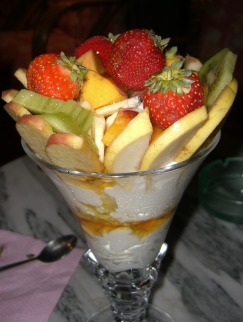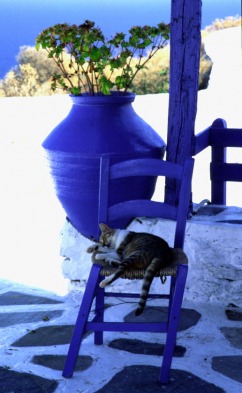Dan Buettner has revealed his latest Aegean Blue Zone Member—the Island of Ikaria. For the official scoop go to: http://www.bluezones.com. For those of you who haven’t yet heard the term blue zones, it refers to geographical locations of populations with the greatest longevity on our planet. Dan postulates eight reasons for Ikarian longevity: 1. Wild greens, 2. Herbal teas, 3. Low sense of time urgency, 4. Daily naps, 5. Mountain living, 6. Strong sense of community, 7. Goat’s milk, and 8. Ikarian diet.
My Athenian-Mykonian girlfriend has been trying to get me to travel to Ikaria for years. She describes it as an island-mountain. I haven’t yet made it there, because it takes a bit longer to reach. These are always the best islands to visit, because you are guaranteed a more authentic experience, especially if you travel off-season. The Greek locations unaffected by tourism are dwindling rapidly—so go before they’re all gone.
If, however, you can’t make it to Ikaria, I can promise that you’ll experience all of these seven longevity gems in any Greek village. That means just about anywhere other than Athens or Thessaloniki. Even popular island destinations such as Mykonos and Santorini become more authentic off-season. Having said that, allow me to share my reflections on what I’ve nicknamed “The Fantastic Eight.”
1. Wild greens. I already hinted in a previous post about the benefits of horta (“grass”), Greek greens. Served with olive oil and a bit of lemon and salt, you not only reap the benefits of incredible antioxidants but also of phytoestrogens in the horta (see Ten Essential Eats and Drinks post) and the good fat in the olive oil. What’s important is that the original Greek diet included horta daily. Most of us are unable to go out our back door and collect armfuls of greens each day, as they do in Ikaria. Instead, we must frequent the local farmer’s market and place baskets of greens into our juicers to have the same benefits. For the Ikarians and Greek villagers, this diet is a way of life.
2. Wild Greek teas and mountain herbs make up the Greek villager’s outdoor medicine cabinet. Again, this is a daily staple. Realize that we have access to all kinds of herbs and teas that have incredible benefits, but in order to reproduce these effects it takes some effort. Unless you are actually living in Greece, the herbs and teas that you obtain in your native country will be different, grown in different soil and different air. But don’t give up; I still drink my tea every day.
3. Low sense of urgency. I love this one! But I dare you to try to recreate this in our crazy American lives. Really!! You can learn a low sense of time urgency only by experiencing it. Then, in order to gain the benefits, you must live it. You might get the hang of it while in Greece. It used to take me three weeks before it would seep in—now it takes the same amount of time as my cross-Atlantic flight. But when you return to the good young USA, get dropped smack dab in the middle of our chaotic, rushed, productivity-driven culture, good luck! Believe me, it is a lifelong practice to incorporate this into a typical American life. It takes a very determined, brave person, to make the kinds of necessary choices to do so. It is absolutely worth it, but realize that you will constantly be going against the American flow! Our society does not know how to step out of linear time, and that’s what this practice requires.
4. Daily naps—whoo hoo! One of my favorites. I love sleep, and I love living in a culture that values naps. It’s great. It also helps you stay up until 2:00 or 3:00am—typical in Greece. The only way we seem to be able to allow ourselves naps here is if we’re stay-at-home Moms (not many left) so totally exhausted by our newborns that we find ourselves nodding off the second our babies do. My mother almost cried when my four-year old nephew announced that he was no longer taking naps, because that meant the end of her naps too. Can you imagine our country stopping each afternoon for three or four hours just so that we all could take naps? Unfortunately, this practice is disappearing in Greek cities as well.
5. Mountain living. Exercise, clean mountain air, and time in the sun are all extremely important healthy practices. We are, as usual, backtracking on recommendations about skin exposure and sunlight. Practically every Vitamin D level I’ve checked on my patients has been low. Here’s the deal. Regular exercise is a part of my everyday routine in Greece. I don’t have a car. I only drive a motorbike when I’m on the islands. That means that I walk everywhere. I have passed entire Athenian days walking, sometimes for over eight hours. I love it. (The pollution, however, I could do without—so, as much as possible, stick with clean air.) I never have to think about exercising in Greece. I feel great. I lose ten pounds. I can eat more without worrying about my diet (because it’s a great Mediterranean diet anyway.) But then I return here, and suddenly there are other demands. I actually have to work for a living; I have to drive everywhere (it would be a bit difficult to walk eighty miles each day). Exercise becomes a chore, something else that I have to fit into my already overcrowded day. Houston, we have a problem here.
6. Strong sense of community. Another one of my favorites. For those of you who have been following me on my feminine health website, you are aware that community is a feminine quality; therefore, by definition, we are community-deficient in our culture. Yet we know how important a strong sense of community is to our health and our sanity. When will we value interdependence as much as independence? How many years are you willing to trade off of your life expectancy in exchange for your independence? A word of caution, though, if you value independence and anonymity then you are going to be very very uncomfortable in Greece!
7. Goat milk. Yeah! All I’ve got to say is try the fresh goat cheese on Skyros. Yummy. And for you carnivores out there—goat’s meat is pretty darn good too (don’t know if it has special health benefits, though.)
8. Ikarian Diet. This is probably one of the easiest of the seven to adopt. Loads have been written on the benefits of the Mediterranean diet. Just remember that you need to consider where and how the food is being grown. Obviously, organic and local are musts, but it’s also important to consider the actual growing conditions. What elements are in the soil? Where is it being grown?
That’s my take on The Fantastic Eight. I would love to hear your ideas. Have you been using any of The Fantastic Eight in your life? Those of us who can’t immediately relocate to a Grecian mountain village are all ears.
Have a happy nap after leisurely gathering with friends over a snack of mountain tea, horta and goat’s milk. (My God, that sounds awful! On second thought, just go for some of my favorite foods and throw in some ouzo…)
|
It is not only unusual foods that make Greek meals interesting. Here are ten things that can assist you in staying on that diet: Happy Dieting!  I’m all for equal opportunity. The following are my Greek Food and Drink Faves: These foods might not appeal to everyone…I felt it was my duty to give you a “heads-up.” Hi Everyone. Welcome! Please keep those helpful comments coming. So far, most of you would like to see a combination of content--so I'll start with some helpful tips and a few short stories. Please send your comments to: [email protected]. Thanks and Happy Reading! © 2009 Rebecca Elia |
Send comments here
Archives
October 2010
Categories
All
|



 RSS Feed
RSS Feed

